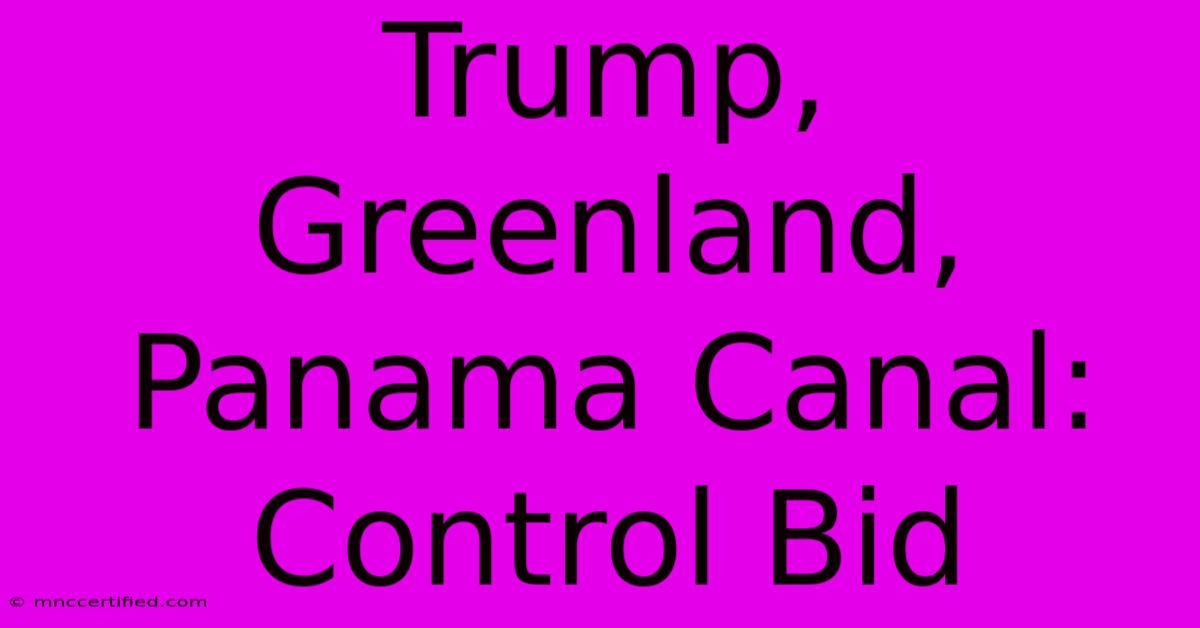Trump, Greenland, Panama Canal: Control Bid

Table of Contents
Trump, Greenland, and the Panama Canal: A Geopolitical Control Bid?
Donald Trump's presidency was marked by several bold, and often controversial, geopolitical initiatives. Among them, his interest in purchasing Greenland and his repeated pronouncements about the importance of the Panama Canal stand out as potentially interconnected strategies aimed at asserting American influence and control. This article explores the possible links between these seemingly disparate actions, examining the strategic implications and the broader context of American foreign policy under the Trump administration.
Greenland: A Strategic Acquisition?
Trump's reported attempt to purchase Greenland in 2019 shocked many. While dismissed by many as a whimsical idea, the proposal revealed a deeper strategic interest in the Arctic region. Greenland's strategic location, vast natural resources (including rare earth minerals crucial for modern technology), and potential for military basing make it a highly coveted territory. Control of Greenland would significantly enhance US influence in the Arctic, a region increasingly important due to melting ice caps opening new shipping routes and access to resources. This aligns with a broader geopolitical strategy of countering growing influence from Russia and China in the Arctic.
The Failure and its Implications
While the purchase bid ultimately failed, due largely to the Danish government's outright rejection, the proposal highlighted the underlying US desire for greater control over Arctic resources and strategic positioning. The incident showcased a willingness to pursue unconventional methods to achieve significant geopolitical goals, even if facing strong opposition.
The Panama Canal: Maintaining a Lifeline
The Panama Canal is a critical waterway for global trade, and its security is a major concern for the United States. Trump frequently highlighted the Canal's importance, emphasizing the need for its continued stability and security. Maintaining US influence over the Canal guarantees unimpeded access for US naval vessels and commercial shipping. This access is vital for projecting power and maintaining economic dominance.
Strategic Significance of the Panama Canal
The Canal’s strategic significance is undeniable. It facilitates faster and cheaper transport of goods between the Atlantic and Pacific Oceans, impacting global trade routes and the American economy. Any disruption or control by a hostile power would have severe repercussions for the US and global trade. Trump's focus on the Canal, therefore, can be interpreted as a continuation of long-standing US policy to ensure its security and accessibility.
Connecting the Dots: A Broader Strategy?
While seemingly disparate, the Greenland initiative and the focus on the Panama Canal share common threads: a desire for enhanced US control over key strategic locations and resources, a pushback against perceived rivals, and a willingness to pursue assertive foreign policy. Both actions, though pursued independently, might have been elements of a broader, albeit informal, strategy to solidify American influence in key global chokepoints.
The Trump Doctrine and Global Power Projection
Trump’s approach to foreign policy, characterized by an "America First" approach, prioritized national interests and a more transactional approach to international relations. The Greenland bid and the emphasis on the Panama Canal align with this doctrine. They reflect a willingness to use unconventional methods and assertive actions to advance American interests, even if it involves challenging established norms and alliances.
Conclusion: Unconventional Geopolitics
Trump's pursuit of Greenland and his emphasis on the Panama Canal, though seemingly unrelated at first glance, potentially reveal a cohesive, if somewhat unconventional, approach to American foreign policy. Both reflect a desire to secure key strategic assets, enhance US global influence, and counter the growing influence of rivals. Understanding this intertwined approach helps clarify the geopolitical objectives of the Trump administration and its legacy on the world stage. Further research is needed to fully understand the intricacies of these strategies and their long-term implications for global power dynamics.
Keywords: Trump, Greenland, Panama Canal, Geopolitics, Strategic Assets, American Foreign Policy, Arctic, Global Trade, National Security, Power Projection, America First, Russia, China, Geopolitical Strategy.

Thank you for visiting our website wich cover about Trump, Greenland, Panama Canal: Control Bid. We hope the information provided has been useful to you. Feel free to contact us if you have any questions or need further assistance. See you next time and dont miss to bookmark.
Featured Posts
-
Anunoby Knicks Extend Winning Streak
Dec 24, 2024
-
Ex Trump Pick Gaetz Faces Sex Charges
Dec 24, 2024
-
Northern Illinois In Potato Bowl 2024
Dec 24, 2024
-
Sevilla Loses To Real Madrid Mbappe Plays
Dec 24, 2024
-
The Odyssey Continues Nolans New Film
Dec 24, 2024